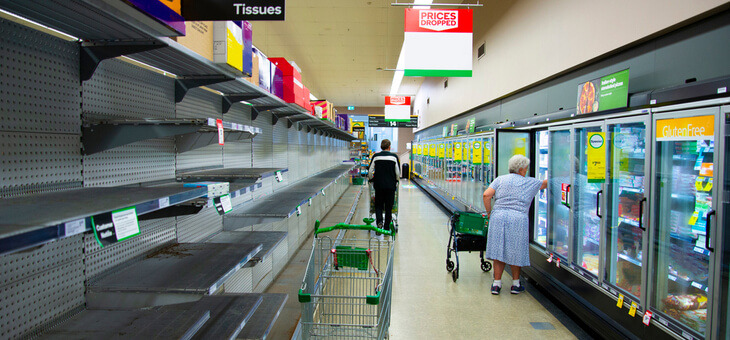The spread of Omicron has placed a huge strain on grocery supply chains, with leading supermarkets struggling to keep shelves stocked and IGA Ritchies CEO calling for a relaxation to COVID quarantine rules for supermarket and distribution staff.
Across Australia, shoppers at the nation’s two largest grocery retailers, Coles and Woolworths, are being confronted by empty shelves as distribution hubs struggle to deal with staff absenteeism rates as high as 40 per cent, the result of many being identified as COVID close contacts and being forced to isolate.
However, Woolworths Group CEO Brad Banducci has implored customers not to panic buy. He says there is no danger of supplies of groceries running out, although customers may not always be able to purchase their favourite brand.
While Coles has reintroduced purchase limits on meat and poultry, Woolworths has resisted following suit.
Read: Woolworths set to transform Australian shopping forever
In response to the ongoing supply chain issues, NSW Health has announced that critical workers in both grocery and manufacturing will now be exempt from isolation requirements, provided they are asymptomatic.
In a statement, released on Sunday, the department advised that “critical workers in the food logistics and manufacturing sectors furloughed as close contacts will be permitted to leave self-isolation to attend work if they have no symptoms of COVID-19, to ensure the state has continued access to essential goods”.
Those workers will be required to adhere to strict risk-management strategies, including the wearing of masks and daily rapid antigen tests (RATs).
Read: When to use a rapid antigen test instead of a PCR swab
Mr Banducci’s IGA Ritchies counterpart, Fred Harrison, has called for a nationally coordinated approach to implementing these exemptions. Speaking to Ali Moore on the ABC Melbourne Mornings show on Monday, Mr Harrison said that IGA’s supply infrastructure spanned three states and that a national strategy would help manage supply logistics.
“We do need a national approach”, he said. “It’s terribly difficult. We’ve got stores in three states and we’re riding three sets of communication. You get yourself confused in the end.”
While Queensland and New South Wales have relaxed isolation rules for food supply workers, Victoria had yet to do so.
Mr Harrison added that a supply of RATs made available to essential services workers would also speed up supply chain turnaround by up to four days.
Do I need to stock up on essentials?
As tempting as it might be to raid your local supermarket’s shelves and grab months’ worth of groceries, there is no need to do so. Data suggests that as long as you have three weeks’ worth of an item, you are unlikely to be unable to find it at a supermarket near you.
Read: Save with these tips to make groceries last longer
Flavio Macau, lecturer and researcher in global logistics and supply chain management at Edith Cowan University, and board member of the Australasian Supply Chain Institute, says purchasing more than three weeks’ supply of even essential items is not necessary.
“I’ve been following these issues closely over the past two years. All of Australia’s supermarket supply crises were dealt with in less than three weeks. You really don’t need more than that.”
Have you had trouble finding essential grocery items? Why not share your experience in the comments section below?
If you enjoy our content, don’t keep it to yourself. Share our free eNews with your friends and encourage them to sign up.

